“We have a cancer within, close to the presidency.” – John Dean, March 21, 1973
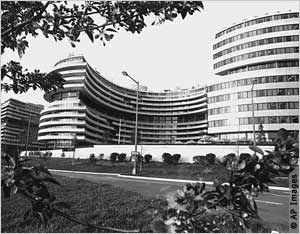 On June 17, 1972, five men were arrested in Washington, D.C. for breaking into and attempting to wiretap the Democratic National Committee headquarters at the Watergate complex in Washington, D.C. An article featured on the bottom of page one in the next day’s Washington Post–written by Alfred E. Lewis with contributions from two young journalists named Bob Woodward and Carl Bernstein–reported the incident.
On June 17, 1972, five men were arrested in Washington, D.C. for breaking into and attempting to wiretap the Democratic National Committee headquarters at the Watergate complex in Washington, D.C. An article featured on the bottom of page one in the next day’s Washington Post–written by Alfred E. Lewis with contributions from two young journalists named Bob Woodward and Carl Bernstein–reported the incident.
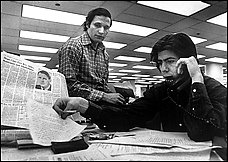 Less than 48 hours after the arrests, President Nixon’s press secretary, Ron Ziegler, described the botched breakin as a, “third-rate burglary attempt.” As Ziegler offered this dismissive characterization, that day’s Washington Post carried an article by Woodward and Bernstein, “GOP Security Aide Among Five Arrested in Bugging Affair.” Subsequent investigation and reporting by the two young writers uncovered a steady stream of details that increasingly linked the Watergate affair to the Committee to Reelect the President, members of Nixon’s administration, and to the White House itself.
Less than 48 hours after the arrests, President Nixon’s press secretary, Ron Ziegler, described the botched breakin as a, “third-rate burglary attempt.” As Ziegler offered this dismissive characterization, that day’s Washington Post carried an article by Woodward and Bernstein, “GOP Security Aide Among Five Arrested in Bugging Affair.” Subsequent investigation and reporting by the two young writers uncovered a steady stream of details that increasingly linked the Watergate affair to the Committee to Reelect the President, members of Nixon’s administration, and to the White House itself.
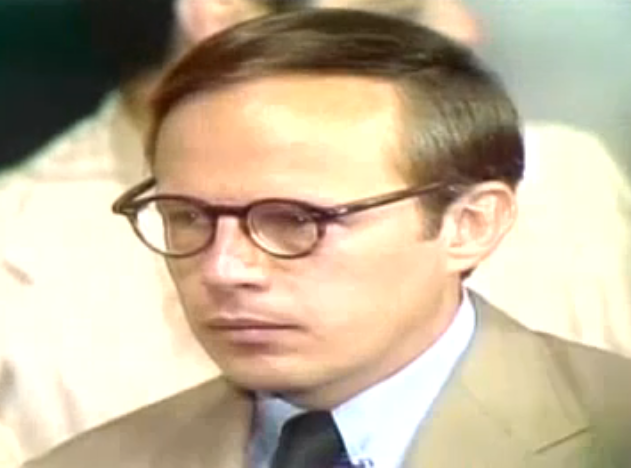 That changed on June 25, 1973 when John Dean, the 34-year-old former counsel to President Nixon, testified before the committee and recounted in specific and credible detail a conversation he had with his boss that occurred 37 years ago today. Dean’s testimony, which was broadcast live on all major television networks and consumed by millions of Americans, would establish the first connection of a presidential cover-up and obstruction of justice. It would also prove to be the first pulled thread in what would become the undoing of the Nixon presidency.
That changed on June 25, 1973 when John Dean, the 34-year-old former counsel to President Nixon, testified before the committee and recounted in specific and credible detail a conversation he had with his boss that occurred 37 years ago today. Dean’s testimony, which was broadcast live on all major television networks and consumed by millions of Americans, would establish the first connection of a presidential cover-up and obstruction of justice. It would also prove to be the first pulled thread in what would become the undoing of the Nixon presidency.
Dean began his riveting testimony by stoically reading a seven-hour opening statement, in which he described the atmosphere of the Nixon White House:
The Watergate matter was an inevitable outgrowth of a climate of excessive concern over the political impact of demonstrators, excessive concern over leaks, an insatiable appetite for political intelligence, all coupled with a do-it-yourself White House staff regardless of the law.
He continued by vividly describing a conversation he had with the President from 10:12-11:55 AM on March 21, 1973:
I began by telling the president that there was a cancer growing on the presidency and if the cancer was not removed that the president himself would be killed by it. I also told him that it was important that this cancer be removed immediately because it was growing more deadly every day…
I told the president about the fact that there was no money to meet their [the Watergate burglars] demands. He asked me how much it would cost. I told him I could only make an estimate that it might be as high as a million dollars or more. He told me that that was no problem. He also looked over at [Chief of Staff H.R.] Haldeman and repeated the same statement
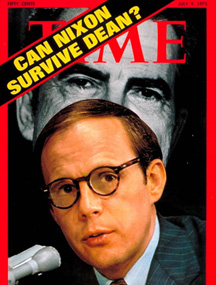 The accuracy of this testimony was soon supported by the revelation of the secretly-recorded conversation (transcript), which was disclosed to the Senate Watergate Committee by Alexander Butterfield (begin play at 3:55), deputy assistant to Haldeman. Dean’s actual words in the March 21 meeting with President Nixon that he described to the Senate Committee less than three months later were:
The accuracy of this testimony was soon supported by the revelation of the secretly-recorded conversation (transcript), which was disclosed to the Senate Watergate Committee by Alexander Butterfield (begin play at 3:55), deputy assistant to Haldeman. Dean’s actual words in the March 21 meeting with President Nixon that he described to the Senate Committee less than three months later were:
I think, I think that, uh, there’s no doubt about the seriousness of the problem we’re, we’ve got. We have a cancer within, close to the Presidency, that’s growing. It’s growing daily. It’s compounding, it grows geometrically now because it compounds itself.
Dean pleaded guilty to obstruction of justice charges in connection to his supervision of hush money payments to Watergate burglars. He was sentenced to one-to-four years in a minimum security prison, but ended up serving only four months at a safe house at Fort Holabird in Maryland. During his incarceration, Dean provided extensive testimony against several other Watergate figures, which helped lead to convictions and jail sentences for Haldeman, as well as for Nixon’s former attorney general John Mitchell and chief domestic policy adviser John Erlichmann. Dean’s testimony also was critical in providing information and momentum that eventually led to the resignation of President Nixon.
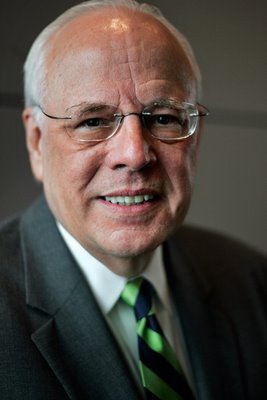 Following his release, Dean has worked as an investment banker and author. His 1976 book Blind Ambition, was a best-selling account of his experience throughout Watergate. An early and vocal critic of the administration of President George W. Bush, Dean has written what he has called an “unplanned trilogy” of books sharply critical of what he considers the radical move right of the Republican party and he has been a frequent lecturer and commentator on news programs. Dean, whose first marriage ended in divorce in 1970, lives in Beverly Hills, California, with his wife Maureen, to whom he has been married for over 38 years.
Following his release, Dean has worked as an investment banker and author. His 1976 book Blind Ambition, was a best-selling account of his experience throughout Watergate. An early and vocal critic of the administration of President George W. Bush, Dean has written what he has called an “unplanned trilogy” of books sharply critical of what he considers the radical move right of the Republican party and he has been a frequent lecturer and commentator on news programs. Dean, whose first marriage ended in divorce in 1970, lives in Beverly Hills, California, with his wife Maureen, to whom he has been married for over 38 years.





Pingback from There is a cancer on the presidency John dean–it starts with making truth into non-truth and non-truth into truth | Eslkevin's Blog
Time August 20, 2018 at 5:14 pm
[…] “We have a cancer within, close to the presidency.” – John Dean … […]